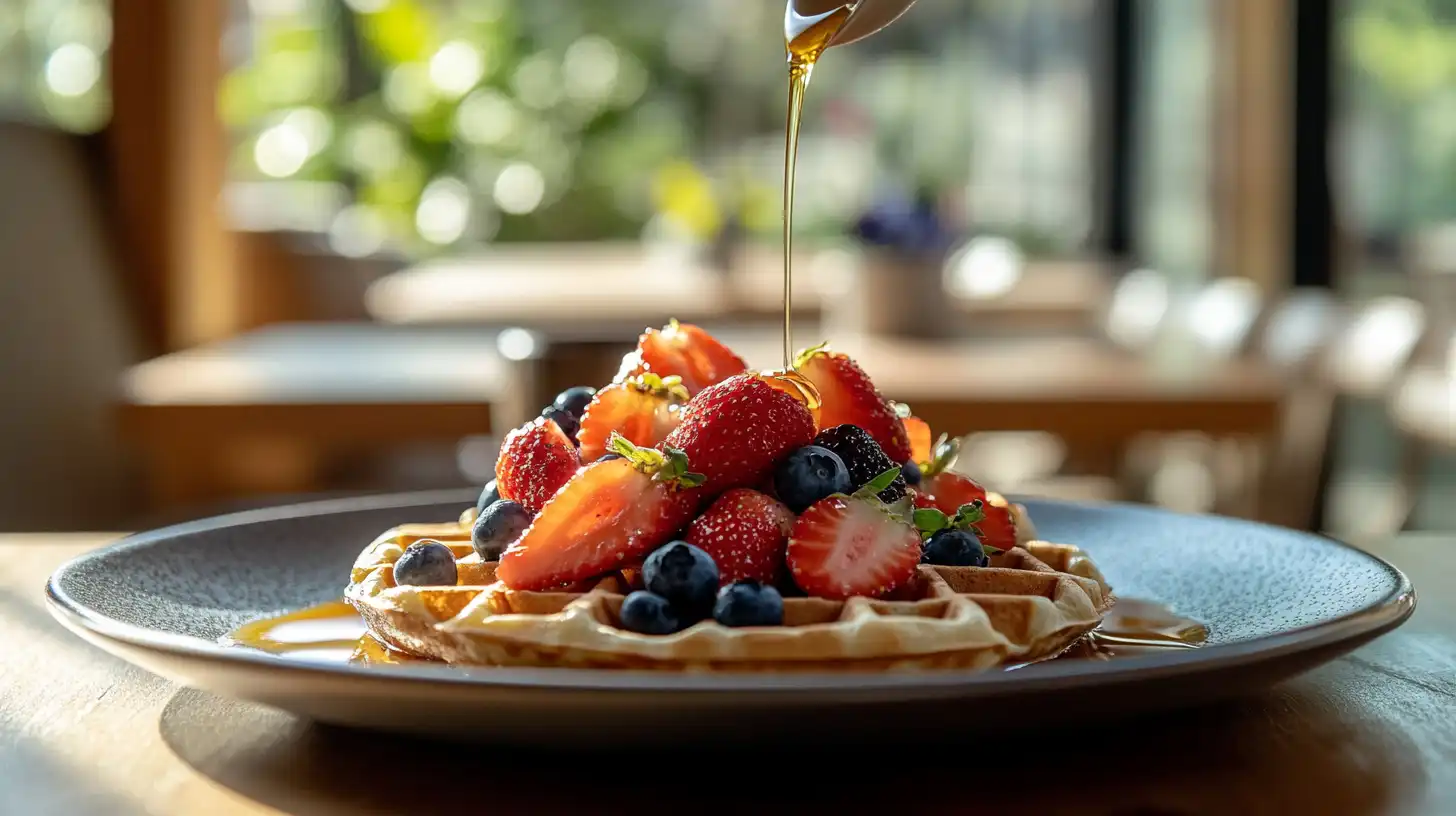Introduction
Waffles have long been a breakfast staple, loved for their fluffy texture and versatility. However, not all waffles are created equal when it comes to nutritional value. With an increasing focus on health and wellness, Kodiak waffles have gained popularity as a “healthier” option compared to traditional regular waffles. But are Kodiak waffles genuinely healthier, or is it all just marketing hype?
In this article, we’ll break down everything you need to know about Kodiak waffles, their ingredients, nutritional profile, and how they stack up against regular waffles. By the end, you’ll have a clear understanding of whether Kodiak waffles deserve a spot in your kitchen.
Table of Contents
What Are Kodiak Waffles?
Ingredients in Kodiak Waffles
Kodiak waffles are made by Kodiak Cakes, a company famous for its whole-grain, high-protein products. The key ingredients include:
- Whole grains: Such as whole wheat flour and oat flour, which provide essential nutrients and fiber.
- Protein blends: Often featuring whey protein isolate, pea protein, or other protein sources to enhance the protein content.
- Minimal sugar: Kodiak waffles are typically lower in sugar compared to traditional waffles.
- Natural flavors: Vanilla, cinnamon, or other subtle flavorings to enhance taste without artificial additives.
Nutrition Profile of Kodiak Waffles
A standard serving of Kodiak waffles (two waffles) generally provides:
- Calories: About 190-220
- Protein: 12-14 grams, depending on the variety
- Fiber: 3-5 grams
- Sugar: 4-6 grams
- Carbohydrates: 24-28 grams
These numbers highlight the focus on high protein and fiber while keeping sugar content low.
What Are Regular Waffles?
Ingredients in Regular Waffles
Regular waffles are typically made from a combination of refined white flour, sugar, and fat. The common ingredients include:
- Refined flour: Often devoid of fiber and nutrients.
- Added sugars: Contributing to higher calorie content.
- Vegetable oils or butter: Used for a richer texture and flavor.
- Artificial additives: Preservatives and artificial flavors are common.
Nutrition Profile of Regular Waffles
A standard serving of regular waffles (two waffles) usually includes:
- Calories: About 250-300
- Protein: 3-5 grams
- Fiber: Less than 1 gram
- Sugar: 10-12 grams
- Carbohydrates: 35-40 grams

Head-to-Head Comparison: Kodiak Waffles vs. Regular Waffles
When it comes to choosing between Kodiak waffles and regular waffles, the comparison boils down to their nutritional content and overall health benefits. Let’s analyze key aspects like protein content, sugar levels, calorie count, fiber content, and the use of additives and preservatives.
Protein Content
Kodiak Waffles:
One of the biggest selling points of Kodiak waffles is their high protein content. With 12-14 grams of protein per serving, they’re an excellent option for people looking to incorporate more protein into their diet. The inclusion of protein blends, such as whey protein or pea protein, makes them particularly attractive to fitness enthusiasts and those following high-protein diets.
Regular Waffles:
In contrast, regular waffles typically offer only 3-5 grams of protein per serving. This is primarily due to the lack of added protein sources in the recipe. Regular waffles are less likely to support muscle building or keep you feeling full for longer periods.
Winner: Kodiak waffles take the lead for protein content, making them a more nutritious choice for sustained energy and muscle repair.
Sugar Levels
Kodiak Waffles:
With only 4-6 grams of sugar per serving, Kodiak waffles are designed to provide natural sweetness without excessive added sugars. This lower sugar content makes them suitable for those managing their blood sugar levels or avoiding sugar spikes.
Regular Waffles:
Regular waffles often contain 10-12 grams of sugar per serving, nearly double that of Kodiak waffles. The higher sugar levels contribute to increased calorie content and can lead to energy crashes shortly after eating.
Winner: Kodiak waffles win again due to their lower sugar levels, aligning better with a balanced diet.
Calorie Count
Kodiak Waffles:
A serving of Kodiak waffles contains approximately 190-220 calories. While they are slightly lower in calories than regular waffles, their higher protein and fiber content make them more filling.
Regular Waffles:
Regular waffles generally range from 250-300 calories per serving. The higher calorie count is primarily due to refined flour, added sugars, and fats.
Winner: Kodiak waffles have a modest edge in calorie count, especially for those watching their caloric intake.
Fiber Content
Kodiak Waffles:
Packed with 3-5 grams of fiber per serving, Kodiak waffles incorporate whole grains like oats and whole wheat. Fiber is essential for digestive health, helping to keep you fuller for longer and supporting regular bowel movements.
Regular Waffles:
Regular waffles typically contain less than 1 gram of fiber per serving, as they rely on refined white flour, which has minimal fiber content. This makes them less satisfying and less beneficial for digestive health.
Winner: Kodiak waffles are superior in terms of fiber content, contributing to overall gut health and satiety.
Additives and Preservatives
Kodiak Waffles:
Known for their focus on natural ingredients, Kodiak waffles generally avoid artificial additives and preservatives. Their clean ingredient list appeals to health-conscious consumers.
Regular Waffles:
Regular waffles often contain artificial flavors, colors, and preservatives to enhance their shelf life and taste. These additives may raise concerns for those aiming to eat more wholesome foods.
Winner: Kodiak waffles win for their minimal use of artificial additives, offering a cleaner and more natural option.
Are Kodiak Waffles Suitable for Specific Diets?
Kodiak waffles have gained a reputation for being versatile and adaptable to various dietary preferences. Here’s how they fit into specific diet plans, including high-protein, low-calorie, gluten-free, and vegan diets.
High-Protein Diets
Why They Work:
Kodiak waffles are an excellent choice for those following a high-protein diet. With 12-14 grams of protein per serving, they provide a substantial boost to daily protein intake. This makes them ideal for athletes, bodybuilders, or anyone looking to build or maintain muscle mass. The protein content also supports sustained energy levels, making them a great pre- or post-workout meal.
How to Enhance:
Pair Kodiak waffles with protein-rich toppings like Greek yogurt, almond butter, or eggs to further increase protein intake.
Low-Calorie Diets
Why They Work:
At approximately 190-220 calories per serving, Kodiak waffles can fit into most low-calorie meal plans. Their high protein and fiber content ensure you feel fuller for longer, reducing the likelihood of overeating.
How to Enhance:
Opt for low-calorie toppings such as fresh fruit, sugar-free syrup, or a dollop of plain yogurt to keep your breakfast light and satisfying.
Gluten-Free Diets
Are There Gluten-Free Options?:
Yes, Kodiak Cakes offers a gluten-free waffle mix that uses gluten-free oat flour and other alternative ingredients. This version caters to individuals with gluten intolerance or those following a gluten-free lifestyle.
Things to Note:
While the gluten-free option is available, it may not be as widely stocked as the traditional mixes. Always check the packaging to ensure it meets your dietary requirements.
Vegan Diets
Challenges for Vegans:
Standard Kodiak waffles are not vegan, as they often contain whey protein and sometimes egg ingredients. However, the company offers plant-based protein waffle mixes designed for vegans, which exclude animal-derived ingredients.
How to Use:
For vegans, the plant-based mix can be combined with non-dairy milk alternatives and vegan toppings like almond butter, bananas, or chia seeds.
Keto and Low-Carb Diets
Are They Keto-Friendly?:
Kodiak waffles are not typically suitable for strict ketogenic diets, as they contain 24-28 grams of carbohydrates per serving. However, they can fit into moderate low-carb diets if consumed in smaller portions.
Alternatives:
For keto enthusiasts, there are other waffle options specifically formulated to be low in carbohydrates.

Health Benefits of Kodiak Waffles
Kodiak waffles are not just a tasty breakfast option—they offer several health benefits that set them apart from regular waffles. Let’s delve into how they support overall health and well-being.
Sustained Energy
How It Works:
The combination of whole grains and protein in Kodiak waffles provides a steady release of energy. Unlike regular waffles that may cause a sugar spike and crash, Kodiak waffles deliver lasting energy, making them a great choice for active individuals or those with busy mornings.
Why It Matters:
Sustained energy helps improve concentration, productivity, and physical performance throughout the day. This makes Kodiak waffles a superior option for breakfast or as a pre-workout snack.
Muscle Building and Recovery
Protein Power:
With 12-14 grams of protein per serving, Kodiak waffles are excellent for muscle repair and growth. Protein is essential for maintaining muscle mass, especially for athletes and fitness enthusiasts.
Key Benefit:
Including Kodiak waffles in your diet supports post-workout recovery and helps rebuild muscle tissue, making them an ideal addition to high-protein diets.
Digestive Health
Fiber for Gut Health:
Kodiak waffles contain 3-5 grams of fiber per serving, thanks to the use of whole grains like oats and whole wheat. Fiber plays a crucial role in maintaining digestive health by:
- Promoting regular bowel movements.
- Supporting a healthy gut microbiome.
- Reducing the risk of digestive disorders like constipation and bloating.
Compared to Regular Waffles:
Regular waffles, made with refined flour, often lack fiber, making Kodiak waffles a better choice for gut health.
Weight Management
Feeling Fuller for Longer:
The high protein and fiber content in Kodiak waffles helps curb hunger and reduces snacking between meals. By keeping you full for longer, they can be a helpful tool for weight management or weight loss goals.
Low-Calorie Advantage:
With fewer calories than regular waffles, Kodiak waffles allow you to enjoy a satisfying breakfast without exceeding your daily caloric intake.
Reduced Risk of Chronic Diseases
Whole Grains as a Key Component:
Whole grains in Kodiak waffles contribute to lowering the risk of chronic diseases such as:
- Heart disease: Due to their ability to improve cholesterol levels.
- Type 2 diabetes: By stabilizing blood sugar levels.
- Obesity: Through better appetite control and nutrient density.
Balanced Nutrition
Nutritional Superiority:
Unlike regular waffles that are often high in sugar and low in nutrients, Kodiak waffles offer a balanced profile of macronutrients—protein, fiber, and complex carbs—while keeping sugar content in check.
Additional Nutrients:
Kodiak waffles also provide micronutrients like iron and B vitamins, further enhancing their nutritional value.
Frequently Asked Questions
To address common concerns about Kodiak waffles, here’s a roundup of frequently asked questions with detailed answers.
Are Kodiak waffles organic?
Answer:
No, Kodiak waffles are not certified organic. While they focus on whole grains and natural ingredients, the lack of organic certification means some components may not be sourced from organic farms. However, their clean ingredient list still appeals to health-conscious consumers.
Can I make homemade Kodiak waffles?
Answer:
Yes, you can make homemade Kodiak waffles using Kodiak Cakes’ waffle and flapjack mixes. These mixes allow you to customize your waffles by adding ingredients like fruits, nuts, or protein powders. All you need is water or milk, and you can cook them in a waffle iron for a fresh, hot breakfast.
Are Kodiak waffles suitable for kids?
Answer:
Absolutely! Kodiak waffles are a nutritious option for children, offering protein and fiber that promote sustained energy and growth. They’re a great way to start a child’s day with balanced nutrition. Just be mindful of toppings to keep the meal wholesome.
Are Kodiak waffles available in gluten-free versions?
Answer:
Yes, Kodiak Cakes offers gluten-free waffle mixes that cater to individuals with gluten sensitivities or celiac disease. These mixes use alternative flours like oat flour to maintain a nutritious profile while eliminating gluten.
Do Kodiak waffles contain artificial sweeteners?
Answer:
No, Kodiak waffles do not contain artificial sweeteners. They use minimal amounts of natural sweeteners like cane sugar or honey for flavor, making them a cleaner alternative to regular waffles that often include artificial additives.
Are Kodiak waffles better than regular waffles for weight loss?
Answer:
Kodiak waffles can be better for weight loss compared to regular waffles due to their high protein and fiber content, which help you feel fuller for longer. However, portion control and topping choices are crucial to maximizing their weight-loss benefits. Pair them with fresh fruit or low-calorie syrups to keep calories in check.
If you’re considering adding Kodiak waffles to your breakfast routine, you might also enjoy making them fresh at home using Kodiak pancake mix. Wondering how to get the perfect consistency? Check out our guide on What is the ratio of water to Kodiak pancake mix? for tips to create fluffy, protein-packed waffles that are both delicious and nutritious.
Conclusion
Kodiak waffles offer a nutritious and versatile alternative to regular waffles, thanks to their high protein and fiber content, lower sugar levels, and use of whole grains. They’re particularly suited for active lifestyles, weight management, and those looking to enjoy a balanced breakfast without compromising on flavor or convenience.
However, they’re not without drawbacks. Their higher price point, limited availability, and denser texture may not appeal to everyone. Additionally, while they cater to many dietary needs, such as gluten-free and vegan options, they’re not ideal for strict low-carb or keto diets.
So, are Kodiak waffles healthier than regular waffles? The answer depends on your dietary goals and preferences. For those prioritizing protein, fiber, and natural ingredients, Kodiak waffles are a clear winner. However, if affordability, taste, or calorie count is your primary concern, regular waffles may still have a place in your pantry.
In the end, Kodiak waffles shine as a wholesome and practical choice, earning their reputation as a better alternative to traditional waffles for health-conscious consumers.

